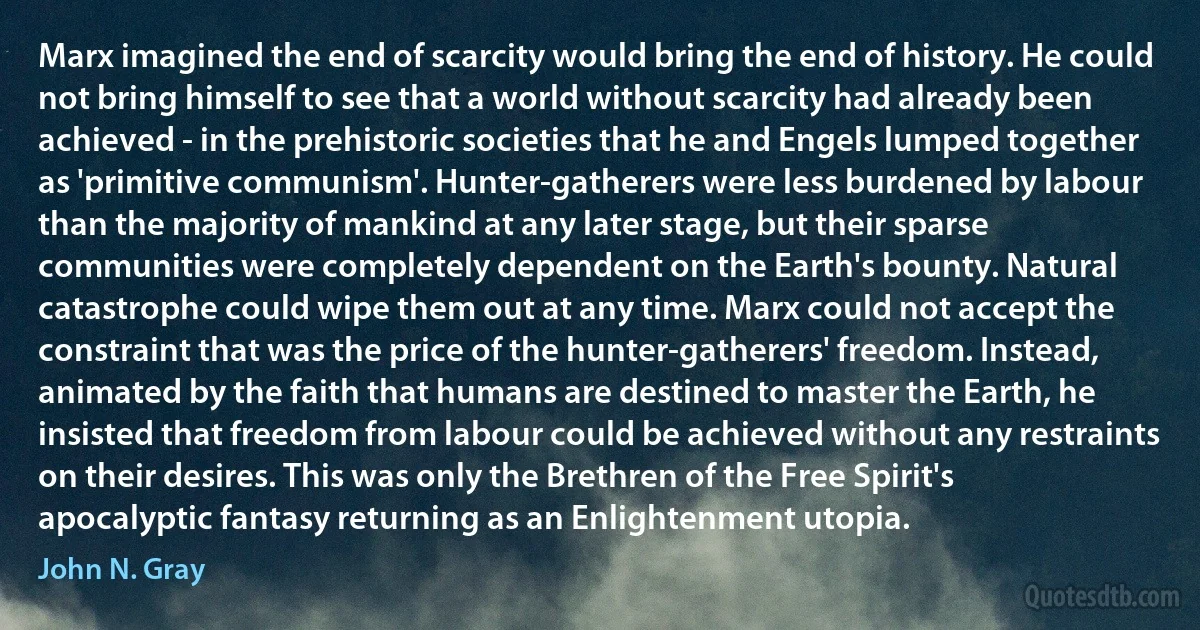
Marx imagined the end of scarcity would bring the end of history. He could not bring himself to see that a world without scarcity had already been achieved - in the prehistoric societies that he and Engels lumped together as 'primitive communism'. Hunter-gatherers were less burdened by labour than the majority of mankind at any later stage, but their sparse communities were completely dependent on the Earth's bounty. Natural catastrophe could wipe them out at any time. Marx could not accept the constraint that was the price of the hunter-gatherers' freedom. Instead, animated by the faith that humans are destined to master the Earth, he insisted that freedom from labour could be achieved without any restraints on their desires. This was only the Brethren of the Free Spirit's apocalyptic fantasy returning as an Enlightenment utopia.
John N. GrayRelated topics
apocalyptic catastrophe earth end faith fantasy free freedom history later less master natural price primitive see time utopia wipe world marx labour engelsRelated quotes
What is the good, I ask, in the name of common sense, of prohibiting sweating in this country if you allow sweated goods to come in from foreign countries? If you insist on limitation, of hours and upon precautions for security, bear in mind all these things add to the cost of production, to the difficulties of the manufacturer in selling his goods, and unless you give him some increased price, some increased advantage in compensation, then he cannot carry on competition any longer. All these conditions in the long run will result not to your advantage, for you will have no work to do, but to the advantage of the foreigner, who is not so scrupulous and who conducts his work without any of these conditions...If protected labour is good, and I think in many ways it is...then it is good to protect the results of labour, and you cannot do one without the other.

Joseph Chamberlain
I gave up on this stuff. I gave up on my species and ... I gave up on my countrymen. Because I think we squandered great gifts. I think humans were given great great gifts: walking upright, binocular vision, opposable thumb, large brain ... We grew. We had great gifts, and we gave it all up for both money and God ... We gave it all up to superstition, primitive superstition, primitive shit ... Invisible man in the sky, looking down, keeping track of what we do, make sure we don't do the wrong thing, if we do, he puts us in hell, where we burn forever. That kind of shit is very limiting for this brain we have. So we keep ourselves limited. And then we want a toy and a gizmo and gold and we want shiny things, and we want something to plug in that will make big big big things for us... And all that shit is nothing! It's nothing.

George Carlin
Don't forget that God sees you and watches you when you are in pain; He perceives even the beating of your heart. Consequently, He will not leave you without consolation and His fatherly protection. Naturally, the saints rejoiced in their afflictions; as for us, let us at least manage to accept affliction or pain patiently.
My child, pray within your heart, and the name of Jesus will become for you a comforting balm so that you can bear this trial of yours in a way which benefits you. You will greatly benefit from this trial if you submit yourself to it patiently. So again I say to you, with the almighty armor of prayer continually approach the omnipotent Lord more often, and you will come to know how He wondrously lifts the burden of pain and marvellously gives rest to sufferers.

Ephraim of Arizona
WHAT HAPPENS AFTER DEATH?
When a human soul goes out of the body, some great mystery happens. For if it is guilty of sins, then there come hordes of demons, evil angels and dark forces, take that soul and drag it to their side.
No one should be surprised at that, because if a man surrendered and fell prey to them while still alive in this world, will not they have even greater control over him and enslave him when he departs from this world?
As for the other, the better part of people, something different happens to them. There are Angels around the holy servants of God in this life; the holy spirits surround them and protect them; and when their souls are separated from the body, the choir of Angels welcomes them into their fellowship, into a bright life, and thus leads them to the Lord.

Macarius of Egypt
In Mussolini's Italy of the nineteen-thirties, when it meant long terms of improsonment, and perhaps torture or even death, to be in any way connected with the Communist Party, and when not only all the works of Marx, Engels, Lenin and Stalin, but the works of all Italian and foreign democrats and progressive were strictly banned from Italian libraries and bookshops, the works of Trotsky, on the "new kind of communism" were "freely" and widely translated and distributed. I remember vividly how in 1938, passing through Italy on the way to meet the anti-fascist and Communist students of Belgrade University, and spending a few hours in Mussolini's Milan, the word "communism" caught my eye on a number of books prominently displayed in a bookshop window. They were the newly translated works of Trotsky.

James Klugmann
